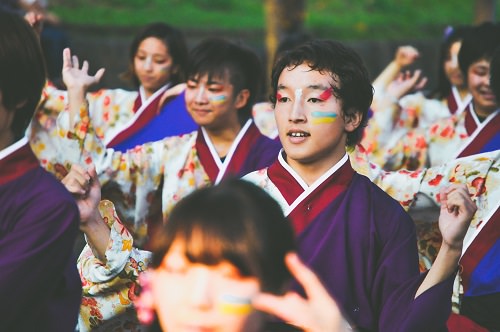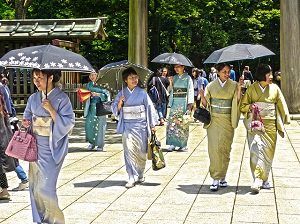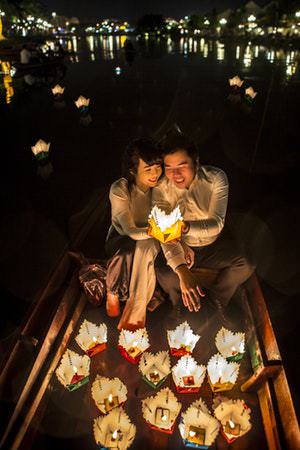 Obon: Celebrate, Respect, and Remember Ancestors
Obon: Celebrate, Respect, and Remember Ancestors
The Obon festival, also known as the Festival of Souls, Ghost Festival, and the Lantern Festival, is an annual event in Japanese culture. Rooted in Japanese Buddhist traditions, Obon is a time to celebrate, respect, and remember family ancestors. Obon holds deep importance in Japanese culture, and is as influential and beloved as New Years. Like many Japanese festivals and holidays, Obon is a blend of tranquil reflection, commemoration, lively festivals, and ancient traditions.
The memorial is traditionally held on the fifteenth day of the seventh month of the lunar calendar. However, when the lunar calendar was substituted by the Gregorian calendar during the Meiji era, the Obon festival date varied across regions. Today, Eastern regions of Japan celebrate Obon on July 15, while others commemorate the holiday according to the lunar calendar. The festival season can extend as late as August 25, but in 2017 the peak season is anticipated to begin August 15.
 Obon is a three day ceremony that calls deceased family members home. In preparation for festivities, families clean homes, visit ancestral graves, buy or craft lanterns, and arrange flowers for the deceased. The Japanese believe that ancestral spirits are called back from the afterlife and return to their realm at the end of the memorial. These spirits are said to travel from the afterlife on a horse and back to the afterlife on a cow so that they may come home quickly and leave slowly. In honor of their journey, cucumbers (horse), eggplants (cow), and disposable chopsticks are used to make figurines displayed in the home.
Obon is a three day ceremony that calls deceased family members home. In preparation for festivities, families clean homes, visit ancestral graves, buy or craft lanterns, and arrange flowers for the deceased. The Japanese believe that ancestral spirits are called back from the afterlife and return to their realm at the end of the memorial. These spirits are said to travel from the afterlife on a horse and back to the afterlife on a cow so that they may come home quickly and leave slowly. In honor of their journey, cucumbers (horse), eggplants (cow), and disposable chopsticks are used to make figurines displayed in the home.

The first day of Obon is spent welcoming ancestral spirits home. Families place offerings of fruit, rice, green tea, sake and lotus-shaped sweets at the graves or family altars. Paper lanterns are hung round the house to help guide the spirits home. Some families carry lanterns from the graves back to their homes.
Although Obon is a memorial, it is not solemn. The second day of Obon is spent celebrating the spirits’ homecoming. Towns build stages in the center, where dancers perform the Bon Odori, or traditional Obon dance. Although this dance varies regionally, it’s usually accompanied by traditional Japanese drums. Along the stage, booths of Japanese treats, games, and shops provide a festival-like atmosphere. Since Obon occurs in summer, many attendees wear traditional yukatas (light-weight kimonos).
The third day of celebration marks the end, and is dedicated to parting ways with deceased loved ones. In some regions, families light bonfires and fireworks as a send off to ancestors. Goodbye ceremonies vary, but among the most significant is toronagashi, or floating lanterns. Lanterns painted with the family’s crest, set in rivers, are carried by the current, and said to help light the spirits way to nirvana.
Obon is celebrated worldwide by Buddhists and Japanese-Americans. The holiday’s remembrance of ancestors and celebration of familial unity spans centuries and generations, calling for a nourishment of cherished memories and family ties. To all of those celebrating, happy Obon festival!
Sharon Schweitzer and Caitlyn Arnold co-wrote this post. Sharon Schweitzer, J.D., is a cross-cultural trainer, modern manners expert, and the founder of Access to Culture. In addition to her accreditation in intercultural management from the HOFSTEDE centre, she serves as a Chinese Ceremonial Dining Etiquette Specialist in the documentary series Confucius was a Foodie, on Nat Geo People. She is the resident etiquette expert on two popular lifestyle shows: ABC Tampa Bay’s Morning Blend and CBS Austin’s We Are Austin. She is regularly quoted by BBC Capital, Investor’s Business Daily, Fortune, and the National Business Journals. Her Amazon #1 Best Selling book in International Business, Access to Asia: Your Multicultural Business Guide, now in its third printing, was named to Kirkus Reviews’ Best Books of 2015. She’s a winner of the British Airways International Trade Award at the 2016 Greater Austin Business Awards
Caitlyn Arnold is a Summer 2017 cross-cultural communication intern at Access to Culture. She is currently a senior at St. Edward’s University, majoring in Global Studies with concentrations in East Asia and International Security. Connect with Caitlyn on LinkedIn.
Photo by Unsplash
Photo by Pixabay
Photo by Pexels

Leave A Comment